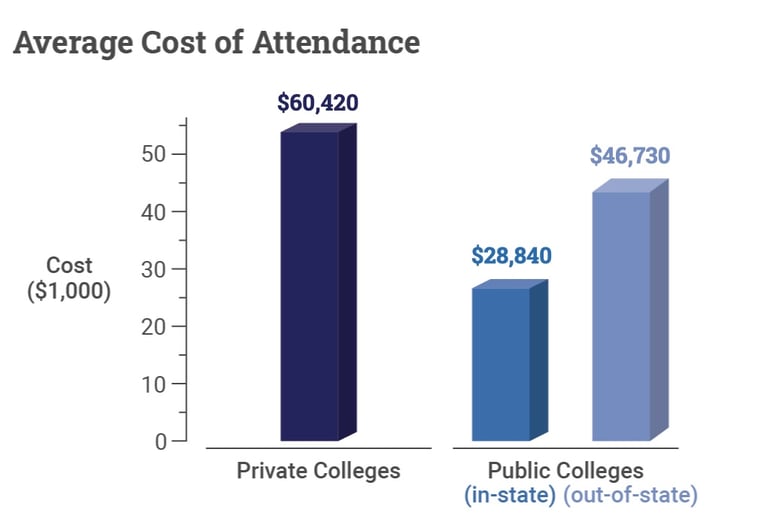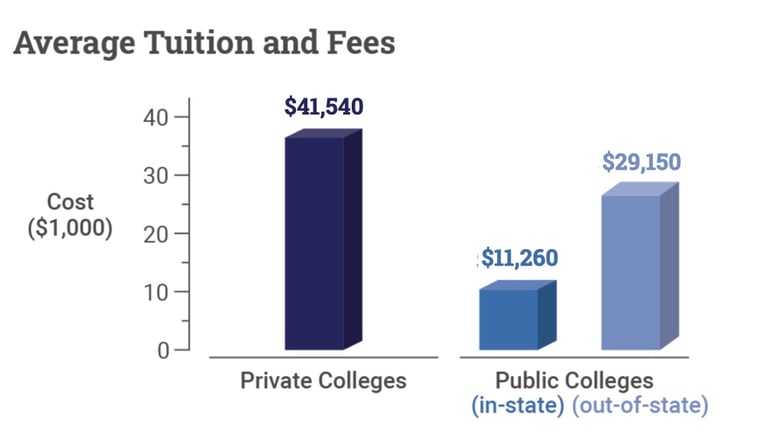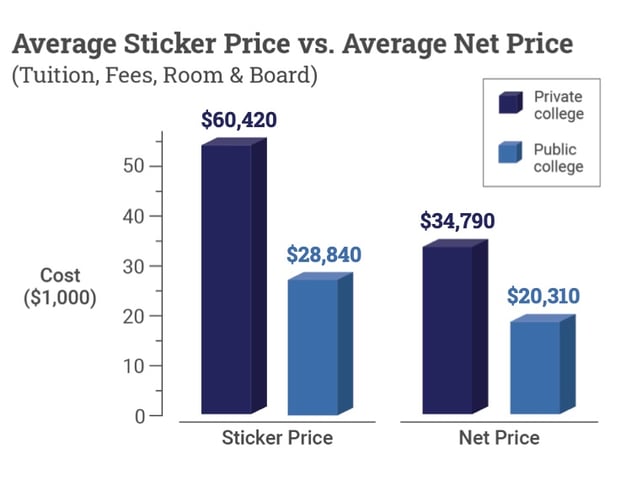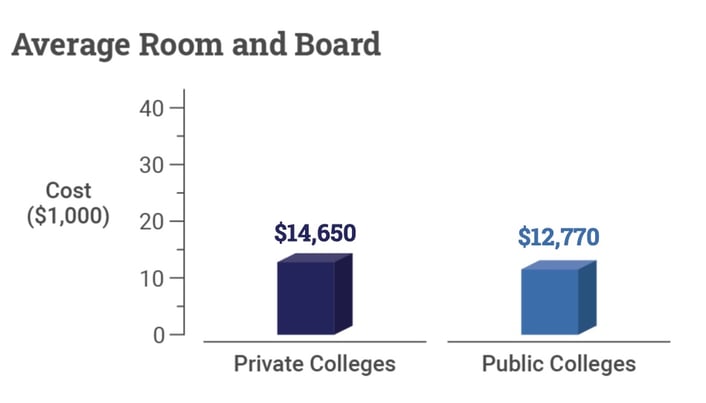How Much Does College Cost?

When thinking about the price of college, people often focus on college tuition costs. But the total price tag can include additional expenses ranging from housing and transportation to school supplies. Let's take a look at the average costs behind a year of college.
In its 2023 report, Trends in College Pricing and Student Aid, the College Board reports that a moderate college budget for an in-state student attending a four-year public college in 2023-2024 averages $28,840. For out-of-state students at public colleges, the average budget comes to $46,730, and for students attending four-year private colleges, the average budget is $60,420.

Source: College Board, Trends in College Pricing and Student Aid, 2023.
What Expenses Go Into the Cost of College?
Colleges estimate the total cost to attend their institution for a single year -- not including grants and scholarships -- in a figure called the Cost of Attendance (COA). Think of the COA as a college’s “sticker price.” Need-based aid, merit aid, and scholarships can reduce your total cost.
Generally, colleges include the following expenses in their COA:
- tuition and fees
- room and board
- books and supplies
- transportation and personal expenses
Take a look at the average total price colleges charged in these categories for the 2023-2024 academic year and keep them in mind when you are planning your own college budget.
Average College Tuition and Fees
Although college tuition and fees are separate costs, colleges usually report a combined tuition and fees figure. For the 2023-2024 academic year, the average price of tuition and fees came to:
- $41,540 at private colleges
- $11,260 at public colleges (in-state residents)
- $29,150 at public colleges (out-of-state residents)
What is college tuition? College tuition is what colleges charge for the instruction they provide. Colleges charge tuition by the units that make up an academic year, such as a semester or quarter. Tuition at public colleges is usually lower for in-state residents. Out-of-state students sometimes pay more than double the tuition of in-state students.
Tuition can vary by major. Students in the sciences, engineering, computing, pre-med programs, and the fine arts often pay higher tuition than students in other majors. For example, at the University of Illinois Urbana-Champaign, students enrolled in the College of Engineering pay about $5,000 more in tuition per year than students pursuing majors in the liberal arts.
What college fees cover. Fees may support services such as the library, campus transportation, student government, and athletic facilities. Fees charged can vary widely from college to college. For example, the University of California, Irvine charges students a “campus spirit fee” to help support the athletics and school spirit programs and a fee to fund the operation of an on-campus food pantry.

Source: College Board, Trends in College Pricing and Student Aid, 2023.
What is the Cost of Room and Board?
The cost of room and board depends on the campus housing and food plans you choose. Living at home with parents will reduce your costs. For the 2023-2024 academic year, average room and board costs are
- $14,650 at private colleges
- $12,770 at public colleges
Some colleges provide room and board estimates for living off-campus. At public colleges, room and board costs are usually the same for in-state and out-of-state residents.
Source: College Board, Trends in College Pricing and Student Aid, 2023.
Cost of Books and School Supplies
The average price of books and school supplies for students attending college in 2023-2024 is $1,290 at public colleges and $1,250 at private colleges.
Over the past ten years, student spending on course materials has declined 57 percent, according to the Association of American Publishers. Between 2021-2022 and 2022-23, the average amount students spent on books decreased by 16 percent, from an average of $339 per student to $285 per student. Some of the reasons for this decline include increased options for students, such as renting textbooks, and an increase in the use of digital materials which can sometimes be less expensive than printed books.
Yet, students often don’t purchase suggested or required textbooks due to their high price tag. According to a survey by Book Scouter, 65 percent of students said they had skipped buying a textbook because of the cost.
Other Expenses
Colleges may estimate some expenses they don't bill you for. These include local transportation, clothing, personal items, and entertainment. The College Board reports that for the academic year 2023-2024, expenses in this category range from $2,980 at private colleges to $3,560 at public universities.
College Net Price vs. Sticker Price
While a college's sticker price can give you an idea of your college costs, it's important to consider a college’s net price, which is the price students and families pay after factoring in financial aid. According to the College Board, the average "net price" families are paying for the 2023-2024 academic year is approximately:
- $34,790 at private colleges*
- $20,310 at public colleges*
*After subtracting financial aid and distributions from the Higher Education Emergency Relief Fund.

Source: College Board, Trends in College Pricing and Student Aid, 2023.
The cost of college may seem overwhelming, but a college education comes at many different price levels, and financial aid can reduce the total cost. Look at the Cost of Attendance as the maximum you and your family might pay. Your college net price can be much lower.





